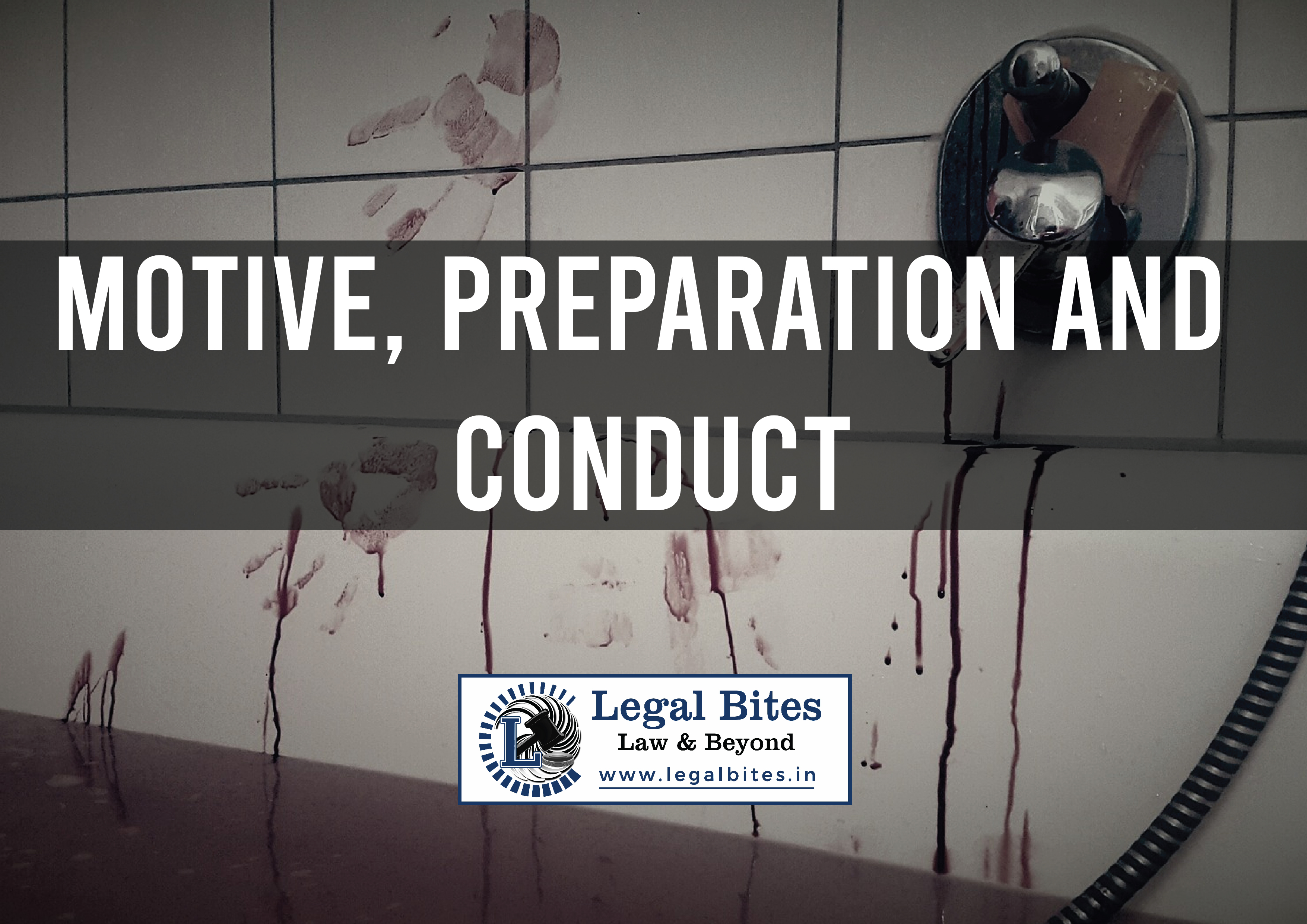This article on 'Motive, Preparation and Conduct' is written by Tejas Vasani and discusses the concepts of motive, preparation and conduct in detail in light of the provisions of section 8 of the Evidence Act. I. Introduction As per section 8 of the Indian Evidence Act, 1872, the motive with which a person commits a certain act or the… Read More »

This article on 'Motive, Preparation and Conduct' is written by Tejas Vasani and discusses the concepts of motive, preparation and conduct in detail in light of the provisions of section 8 of the Evidence Act. I. Introduction As per section 8 of the Indian Evidence Act, 1872, the motive with which a person commits a certain act or the preparation which he makes towards the commission of the act is a relevant fact. The question of motive and preparation is important in cases that purely...
This article on 'Motive, Preparation and Conduct' is written by Tejas Vasani and discusses the concepts of motive, preparation and conduct in detail in light of the provisions of section 8 of the Evidence Act.
I. Introduction
As per section 8 of the Indian Evidence Act, 1872, the motive with which a person commits a certain act or the preparation which he makes towards the commission of the act is a relevant fact. The question of motive and preparation is important in cases that purely rely on circumstantial evidence. The rule of res gestae testimony is that it may be allowed when the said testimony goes right to the root of the matter directly connected with the commission of the crime. This particular principle has been embodied in section 8 of the Evidence Act.
II. Motive
Motive refers to the internal motivation that tempts a man to do a particular act. As a general rule, there can be no act without a motive. The voluntary actions of sane persons are always guided by a motive. The conduct of the person is regarded as proof of the motive. It must be noted that motive, by itself, is not an incriminating circumstance[1] and cannot be used in place of proof.[2] Motive assumes an important role in cases relying solely on circumstantial evidence because, in such cases, motive itself is seen as a circumstance.[3]
In Chunni Lal v. State of U.P.,[4]the accused, who expected of inheriting his childless Uncle's property, was frustrated when the Uncle got married and had a child. The uncle was murdered and the accused was found to be struggling to get the property transferred in his name. These facts were held to be relevant since they established a motive on part of the accused to murder the deceased.
III. Preparation
Preparation refers to the act of arranging for the means and methods required for the commission of the crime. Thus, where 'A' is being tried for the murder of B by poison, the fact that 'A' had procured a similar poison prior to the murder is relevant. However, no inference of guilt shall arise when it has been established that the preparation so made was innocent or was for another act that may be legal or illegal.
IV. Conduct
A fact may be proved by scanning the conduct of a party and the surrounding circumstances. Statements which are either explaining the conduct or are accompanying it are also considered to be a part of the conduct itself. In M. Malkani v. State of Maharashtra,[5] recorded telephone conversation about the settling of the bribe-money was held to be evidence of conduct. Absconding of an accused is relevant conduct under the Evidence Act. However, it must be noted that the act of absconding is indicative of the guilt of the accused only to a certain extent since even innocent persons tend to abscond due to the instinct of self-preservation.[6]
In Sunil v. State of Rajasthan,[7] the presence of the accused near the village before and after the crime took place was held to be evidence of conduct under section 8 of the Evidence Act.
V. Conclusion
Motive preparation and conduct are essential to prove mens rea or a guilty mind. The section is accorded a high amount of importance in case of circumstantial evidence. It is due to this reason that the section is often regarded as one of the most provisions in the Evidence Act.
Edited by- Akriti
References
[1] Tara Devi v. State of U.P., AIR 1991 SC 342.
[2] State of Punjab v. Sucha Singh, AIR 2003 SC 1471.
[3] Varun Chaudhary v. State of Rajasthan, AIR 2011 SC 72.
[4] AIR 2010 SC 2467.
[5] AIR 1973 SC 157.
[6] Thimma v. State of Mysore, AIR 1971 SC 1871; Rahman v. State of U.P., AIR 1972 SC 110; Ramnathan v. Tamil Nadu, AIR 1978 SC 1204.
[7] 2001 Cr LJ 3063 (Raj).


